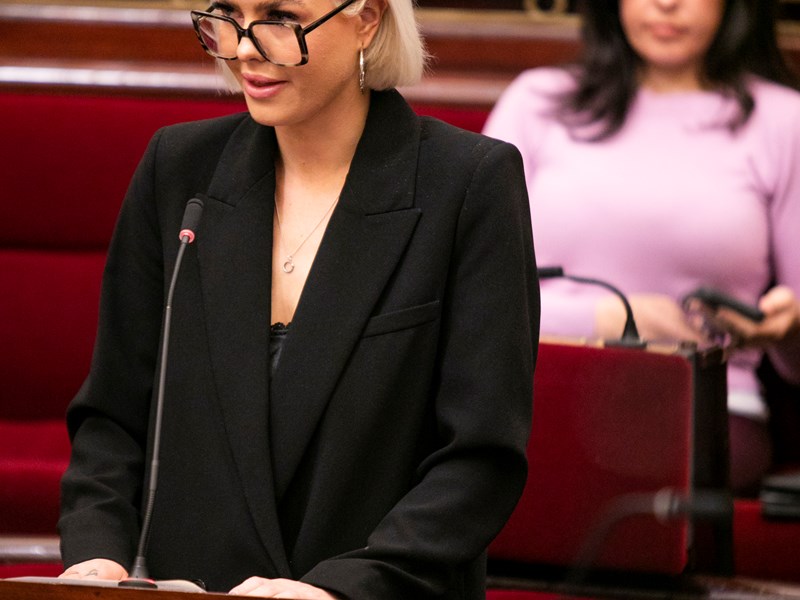
Access to the live web streaming proceedings of the Houses and Committees of the Parliament of Victoria is provided on the condition that:
- You will not record, download, copy, modify, reproduce, republish, upload, post, transmit or distribute, in any manner, any of the proceedings other than in accordance the rules of the Legislative Assembly and the Legislative Council.
- The material is not to be used for political party advertising or election campaigns; satire or ridicule; commercial sponsorship or advertising; or media advertisements or promotion.
- The Parliament of Victoria is not liable for any loss or damage arising from the use of the material or from delays or interruptions to the service; nor can uninterrupted service be guaranteed.
- You agree that by clicking the 'I agree' button, or by using this site and any services (including the content provided therein), you are agreeing to be bound by these terms of service. If you do not accept these terms of service in their entirety, do not access or use the site or services.
Any violation of these terms of service may constitute a breach of parliamentary rules, and may also be a contempt of Parliament, subject to severe penalties.
Warning: any rebroadcast or publication of any part of the proceedings is not protected by parliamentary privilege.

Live stream not available
Legislative Council live stream
Live now
Today in the Council
The sitting starts at 9.30 am
Expected order of business
Formal business
Members' statements
General business
Question time at 12.00 noon
General business continues
Statements on papers and petitions
Petitions qualifying for debate
Government business
Adjournment debate
At 6.20 pm the Council will suspend for a joint sitting.
Progressive minutes will be published at approximately 11.30 am
Sitting day resources
General business expected to be debated today
Notice of motion No. 705, standing in Ms Purcell's name on production of documents relating to the unprotection of dingoes Order in Council.
Notice of motion No. 541, standing in Mr Ettershank's name on bus networks.
Notice of motion No. 704, standing in Ms Crozier's name referring an inquiry to the Mental Health and Wellbeing Commission.
Notice of motion No. 498, standing in Ms Crozier's name on health funding.
Notice of motion No. 600, standing in Mr Bourman's name on deer hunting.
Order of proceedings
Start of the sitting day
The President begins the day by reading the Lord's Prayer and making an Acknowledgement of Country. The President reads any messages received from the Governor and the Legislative Assembly.
Formal business
During formal business the Council deals with administrative issues. These include introducing bills, tabling petitions and reports and giving notices of motions (proposals) for later debate.
Members' statements
Members make statements on any topic.
This debate lasts for around 15 to 20 minutes.
General business
Debates on matters which non-government members have introduced to Parliament. These can include bills (proposed laws) and motions (other proposals).
Question time
Question time allows non-government members to ask questions, usually to ministers, about the Government's decisions and actions. These questions are called questions without notice, because ministers have not seen them beforehand. Question time happens every sitting day.
If the minister’s answer is not responsive, the President may order the minister to provide a written answer.
Ministers may also make ministers’ statements during question time.
Constituency questions
Members ask questions which relate to their own electorate. Ministers respond later in writing.
General business (continues)
Debates on matters which non-government members have introduced to Parliament. These can include bills (proposed laws) and motions (other proposals).
Statements on reports, papers & petitions (5.15 pm)
Members make statements on any report, paper or petition tabled in the Council in the current parliament.
Search the tabled documents database and the e-petitions page.
Government business
Debates on matters which ministers have introduced to Parliament. These can include bills (proposed laws) and motions (other proposals).
Adjournment debate
At the end of the sitting day, the President stops debate. Unless a minister decides or members vote to continue the sitting, the adjournment debate will begin. Members can raise matters with ministers.
The topics are wide ranging, but members must request ministers take action in areas of government responsibility. Ministers can respond after all matters have been raised or later, in writing.